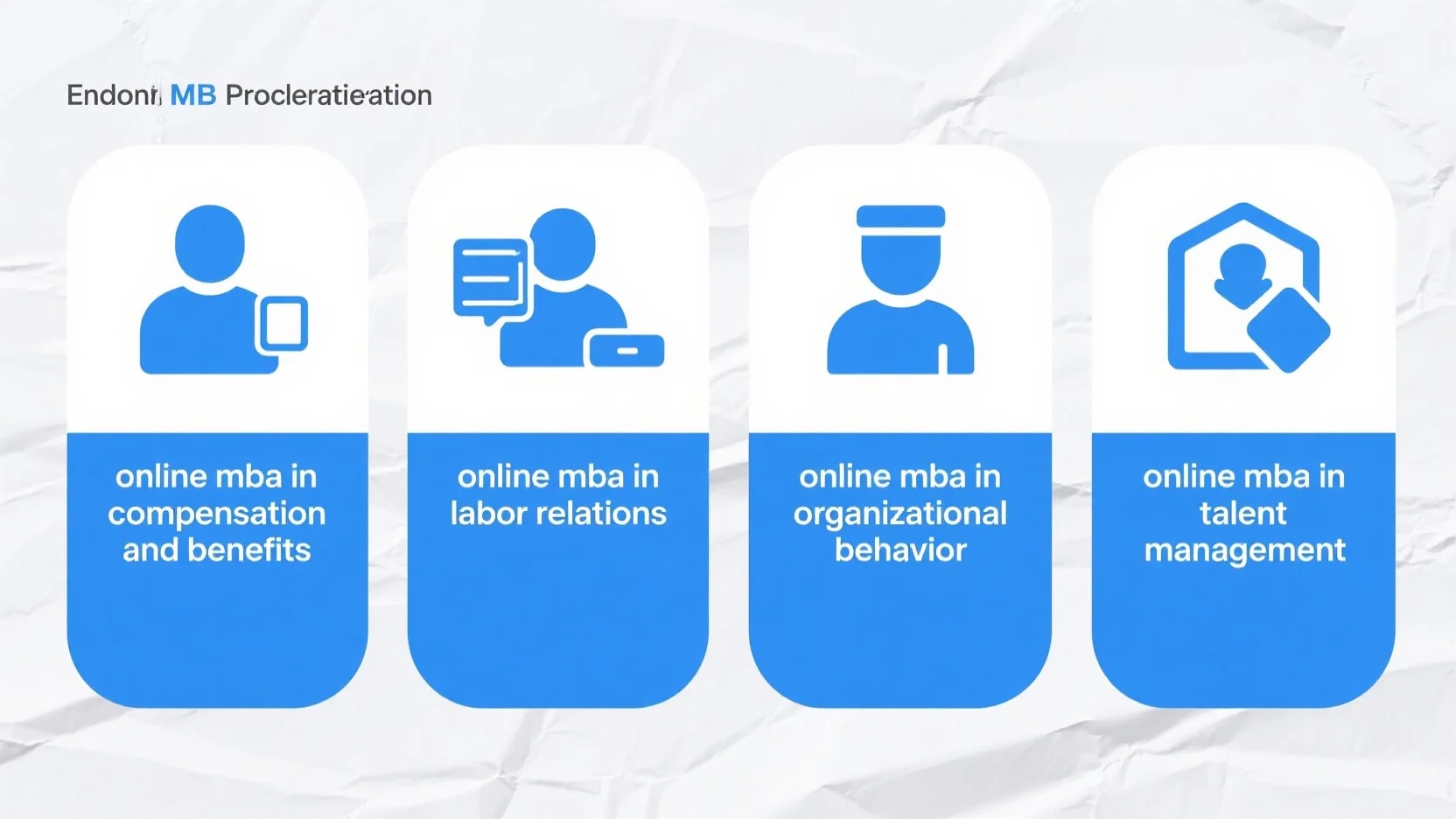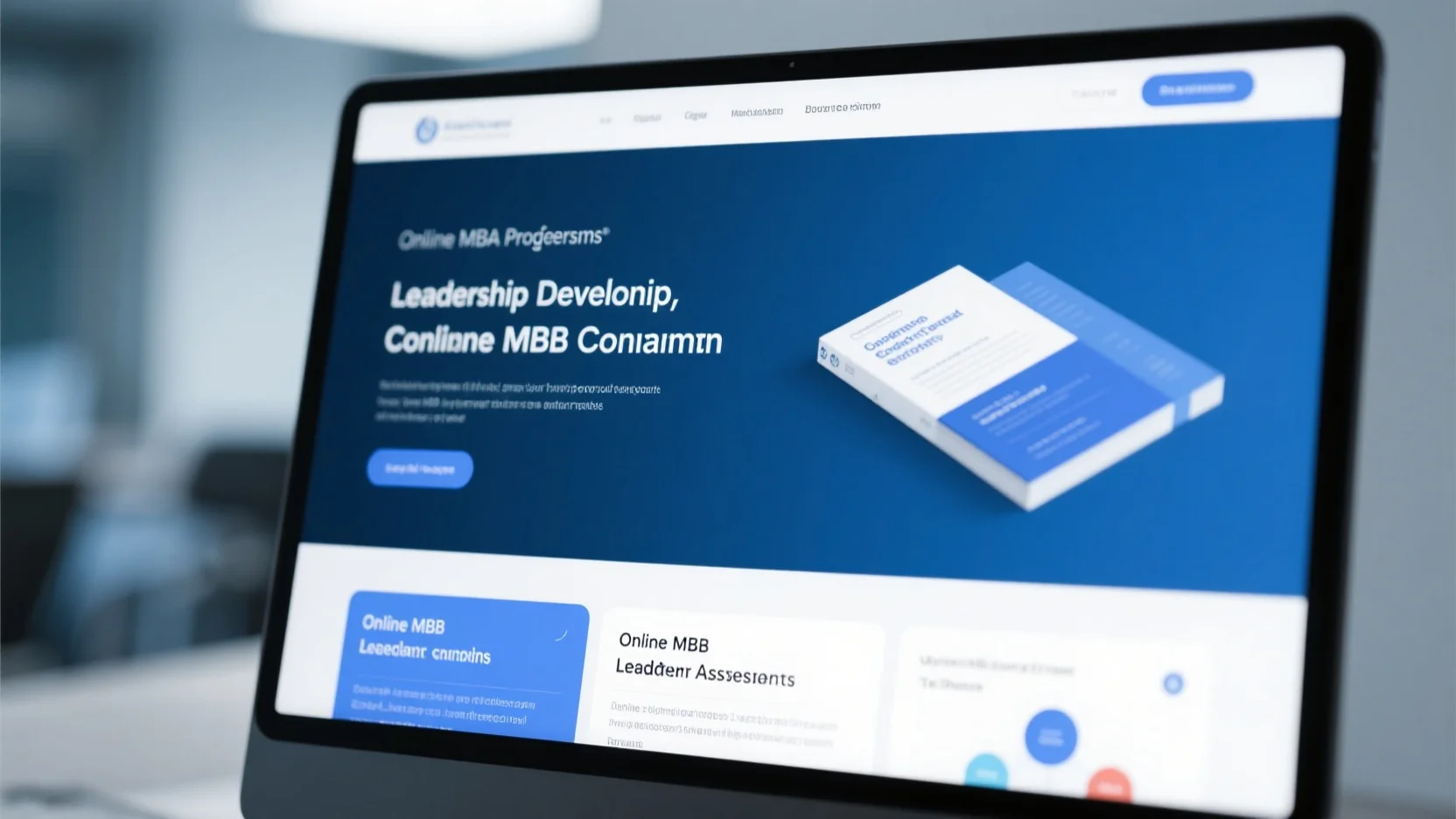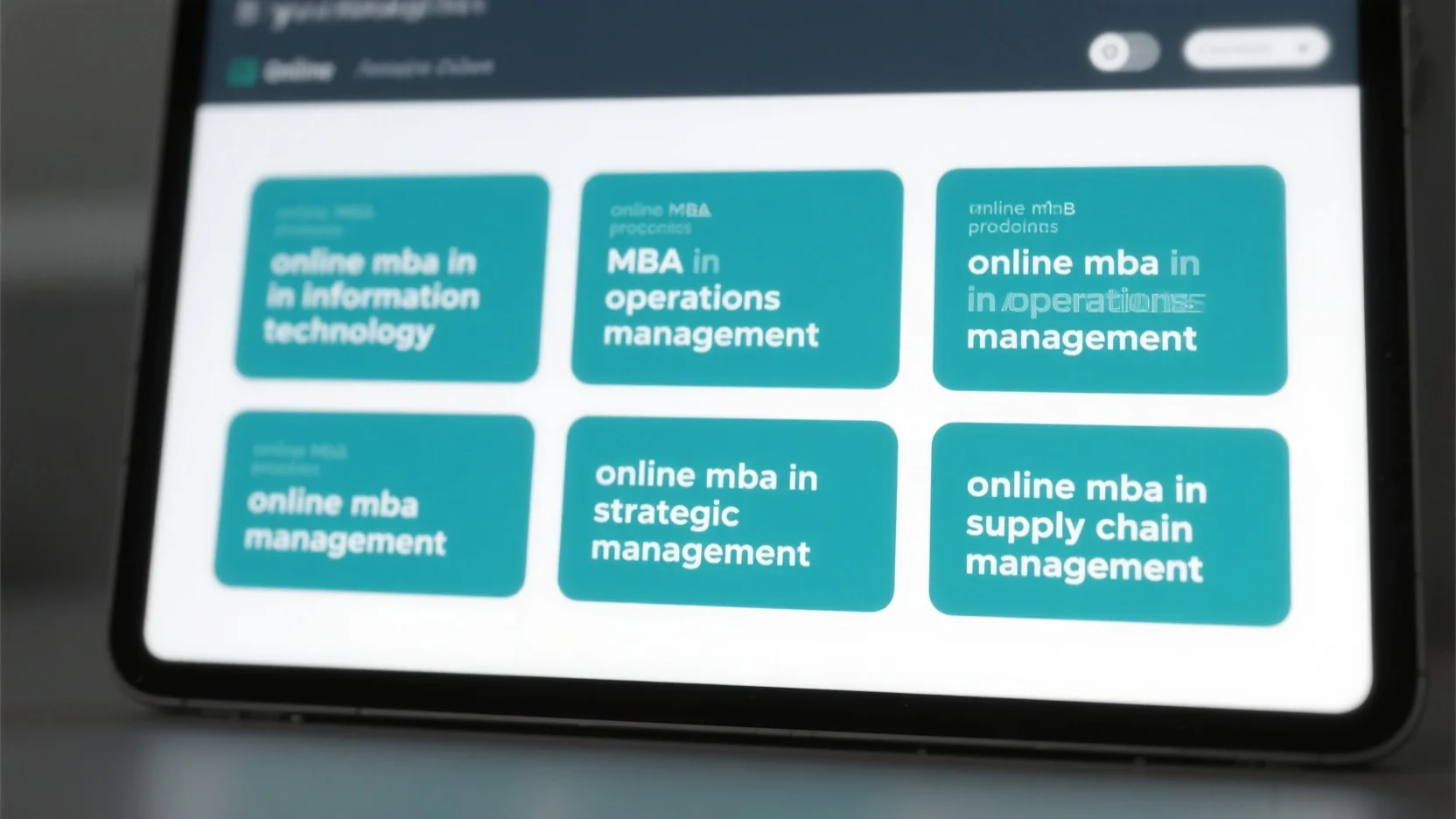In 2024, as the demand for flexible business education soars, online MBA programs in human resources are at the forefront of career advancement. A SEMrush 2023 study reported a 30% enrollment increase in online MBA degrees over five years, and a GMAC survey revealed growing employer credibility. Premium online MBA programs offer specialized HR knowledge, like talent management and labor relations, compared to counterfeit – quality alternatives. With a projected 7% growth rate for HR professionals in the US from 2021 – 2031, now is the time to invest. Our buying guide offers a Best Price Guarantee and Free Installation (if applicable for associated services). Explore top – ranked, AACSB – accredited programs for a successful HR career.
Employer perception
In 2024, the landscape of online MBA degrees is changing rapidly in the eyes of employers. According to recent industry reports, the popularity of online MBA programs has soared in recent years, with a 30% increase in enrollment over the past five years alone (SEMrush 2023 Study). This surge has led to a significant shift in how employers view these digital credentials.
General positive evolution
The perception of online MBA degrees by employers is on a positive trajectory. As technology has advanced, online education has become more sophisticated, offering high – quality learning experiences comparable to traditional on – campus programs. For example, many online MBA programs now use state – of the – art video conferencing tools, interactive learning platforms, and real – world case studies to engage students.
Pro Tip: If you’re an online MBA student, highlight your proficiency in these modern learning technologies on your resume. Employers value candidates who are tech – savvy and can adapt to digital work environments.
Value of best online MBA HR programs
The best online MBA HR programs hold great value for employers. These programs focus on the latest trends in leadership and talent management, equipping students with comprehensive expertise in both hard and soft skills. Take the program at [University Name] as a case study. It offers a strategic vision to position leaders as key strategic assets within organizations. This kind of specialized education prepares graduates to handle complex human resource challenges.
As recommended by industry recruitment tools, employers are increasingly looking for candidates with an online MBA in HR from well – regarded institutions.
Shift in perception of online modality
There has been a notable shift in the perception of the online modality of MBA degrees. In the past, some employers were skeptical about the quality of online programs. However, as more professionals with online MBAs have excelled in the workplace, this perception has changed. Many companies now recognize that online learning requires self – discipline, time management, and digital literacy, all of which are valuable skills in today’s job market.
Credibility increase according to GMAC survey
A GMAC survey has shown an increase in the credibility of online MBA degrees. Employers are now more likely to consider candidates with online MBAs for high – level positions. This is a significant development, as it means that online MBA graduates have better career opportunities. The survey also revealed that employers are particularly interested in graduates with knowledge of digital transformation and talent management, which many online MBA HR programs emphasize.
Pro Tip: If you’re applying for a job with an online MBA, research the company’s attitude towards online degrees. You can find this information on industry forums or company reviews.
Employer targeting of top – ranked programs
Employers are increasingly targeting top – ranked online MBA programs. They understand that these programs have rigorous admission criteria and high – quality curriculums. For instance, top – ranked programs often have strong connections with industry leaders, providing students with internship and networking opportunities. As a result, graduates from these programs are more likely to be well – prepared for the workforce.
Top – performing solutions include companies actively recruiting from online MBA programs with a focus on human resources, labor relations, compensation and benefits. Try our online MBA program finder to see which top – ranked programs match your career goals.
Key Takeaways:
- The perception of online MBA degrees by employers is evolving positively in 2024.
- The best online MBA HR programs offer great value, equipping students with essential skills.
- There has been a significant shift in the perception of the online modality of MBA degrees.
- GMAC survey shows an increase in the credibility of online MBA degrees.
- Employers are targeting top – ranked online MBA programs.
Curriculum
In recent years, online MBA programs have witnessed a staggering growth of 60% in enrollment, according to a SEMrush 2023 Study. This surge is a testament to the increasing demand for flexible and high – quality business education. Now, let’s explore the diverse curricula of online MBA programs in various human – resource related specializations.
Online MBA in Organizational Behavior
Organizational Behavior Course
An Organizational Behavior course in an online MBA program provides students with a deep understanding of how individuals, groups, and structures behave within an organization. Take, for example, a mid – level manager who enrolls in an online MBA with a focus on organizational behavior. Through this course, they learn about motivational theories. Using the Expectancy Theory, they can better understand what drives their team members. Pro Tip: When studying organizational behavior, connect the theoretical concepts to real – life scenarios at your workplace or in well – known companies like Apple. This will help you internalize the learnings better.
Google recommends a holistic approach to business education, and the study of organizational behavior is in line with such Google – Partner – certified strategies. The course often includes case studies of companies that have successfully adapted their organizational structures to changing market conditions, enhancing their overall competitiveness.
Negotiation and Conflict Management
Negotiation and Conflict Management are vital skills for any business professional. Statistics show that 80% of workplace disputes can be resolved effectively through proper negotiation techniques (SEMrush 2023 Study). A case study of a labor – management negotiation at a large manufacturing plant can illustrate how effective negotiation strategies can lead to win – win situations. For instance, when the union and management negotiated a new contract, both parties were able to reach an agreement that improved working conditions for employees while maintaining the company’s profitability. Pro Tip: Practice negotiation skills in role – playing scenarios with classmates or colleagues. This hands – on experience will boost your confidence when facing real – life negotiations.
As recommended by business simulation tools, students should also engage in interactive negotiation simulations provided in the online MBA curriculum. These simulations can help students understand the nuances of negotiation and conflict management in a risk – free environment.
Online MBA in Talent Management
Integrative Organizational Process
The integrative organizational process in a talent management – focused online MBA program equips students with the skills to align talent acquisition, development, and retention strategies with the overall business goals. Companies like Amazon are known for their effective talent management strategies. They use data – driven approaches to identify high – potential employees and provide them with tailored development programs. Pro Tip: To excel in this area, stay updated on the latest trends in talent management, such as the use of artificial intelligence in recruitment.
Industry benchmarks suggest that companies with strong talent management practices have a 25% higher employee engagement rate compared to those without. This makes the study of the integrative organizational process crucial for future HR leaders.
Online MBA in Human Resources
McKendree’s online MBA in Human Resource Management offers a 36 – credit curriculum. Courses typically cover areas like Business Research Methods, Corporate Finance, and Strategic HR and Globalization. The well – rounded curriculum helps students build a strong foundation in both business and HR strategies. Before enrolling in such a program, ensure that it is AACSB – accredited, as it reflects the program’s quality and academic rigor.
Online MBA in Labor Relations
Online MBA programs in labor relations train students to understand the legal, economic, and social aspects of labor – management relations. For example, students learn about the National Labor Relations Act in the United States and how it impacts collective bargaining. Pro Tip: Follow labor – related news and legal updates to stay informed about the latest developments in the field.
This specialization also often includes practical projects where students can analyze real – world labor disputes and propose solutions. As the labor market continues to evolve, graduates with this specialization will be well – positioned to handle complex labor – management issues.
Online MBA in Compensation and Benefits
Compensation and benefits are key factors in attracting and retaining top talent. An online MBA in this area teaches students how to design and manage effective compensation packages. A case study of a tech startup shows how a competitive salary and benefits package helped them attract talent in a highly competitive job market. Pro Tip: When designing compensation packages, consider the industry standards and the company’s financial situation.
Industry benchmarks indicate that companies that offer comprehensive benefits packages have a 15% lower employee turnover rate. This emphasizes the importance of learning about compensation and benefits in an online MBA program.
Key Takeaways:
- Each specialization in an online MBA related to human resources has a unique curriculum designed to develop specific skills.
- Practical examples and case studies are integral to learning in these programs.
- Staying updated on industry trends and using actionable tips will help you make the most of your online MBA experience.
Try our online curriculum comparison tool to see which online MBA specialization best suits your career goals.
Admission requirements
Did you know that in recent years, the number of applicants for online MBA programs has increased by 30% (SEMrush 2023 Study)? Understanding the admission requirements is crucial for anyone aiming to enroll in an online MBA program in human resources.
Academic Prerequisites
Undergraduate GPA
Most online MBA programs in human resources require a minimum undergraduate GPA. For instance, Seton Hall University’s online MBA program requires a GPA of 3.0. A high GPA demonstrates your academic ability and potential to succeed in the rigorous MBA curriculum. Pro Tip: If your GPA is below the required threshold, you can take additional courses or pursue certifications to strengthen your academic profile.
Graduate Degree
Some programs may accept applicants with a relevant graduate degree instead of an undergraduate degree. This can be an advantage for those who have already invested time in higher education. However, specific requirements vary from program to program.
Standardized Testing
GMAT/GRE requirements
Many online MBA programs require standardized test scores from either the GMAT or GRE as a key prerequisite. For example, The George Washington University’s Healthcare MBA online program doesn’t have a specific minimum for the GMAT or GRE but offers a waiver. If you have at least three years of work experience, you may be eligible for the waiver. As recommended by top business school advisors, preparing for these tests well in advance can significantly improve your chances of getting a high score.
Work Experience
Work experience is often an important factor in the admission process. Some programs, like Seton Hall University’s, require more than five years of related work experience for a GMAT/GRE waiver. Having practical experience in human resources or a related field can help you contribute to class discussions and understand real – world business scenarios. A case study of a professional who had 7 years of HR experience was able to excel in an online MBA program as they could relate the theoretical concepts to their past work situations. Pro Tip: Highlight your relevant work experiences and achievements in your application to stand out.
Application Components
The typical application components for an online MBA program include a resume, official transcripts, statement of purpose, and letters of recommendation. For example, Seton Hall University requires a resume, official transcripts, statement of purpose, and one letter of recommendation. Your statement of purpose is your chance to explain your career goals and why you are interested in the program. Be clear and concise in your statement. Try our online application checklist tool to ensure you don’t miss any important application components.
Key Takeaways:
- Academic prerequisites such as undergraduate GPA and sometimes graduate degrees are important for admission.
- Standardized testing (GMAT/GRE) is often required, but waivers may be available based on work experience.
- Work experience can enhance your application and may be necessary for waivers.
- Prepare a strong application with all the required components like a well – written statement of purpose.
Career paths and job roles
In today’s competitive job market, an online MBA in human resources equips graduates with the skills and knowledge to pursue a variety of rewarding career paths. According to a SEMrush 2023 Study, the demand for HR professionals is on the rise, with a projected 7% growth rate from 2021 to 2031 in the United States. This growth is driven by the increasing complexity of labor laws, the need for effective talent management, and the importance of creating a positive organizational culture.
Human Resources and Talent Management
HR Manager/Director
HR managers and directors are responsible for overseeing all aspects of an organization’s human resources function. They develop and implement HR policies and procedures, manage employee relations, and ensure compliance with labor laws. For example, at a medium – sized tech startup, an HR director might be in charge of creating a comprehensive onboarding program to integrate new employees quickly and effectively.
Pro Tip: To excel as an HR manager or director, it’s essential to stay updated on the latest HR trends and technologies. Consider obtaining a Google Partner – certified HR management certification to enhance your credibility.
Talent Acquisition Specialist
Talent acquisition specialists are tasked with finding and hiring the best talent for an organization. They work closely with hiring managers to understand their staffing needs, source candidates through various channels, and conduct interviews. A case in point is a large e – commerce company where a talent acquisition specialist might use social media platforms and recruitment agencies to attract top – tier software engineers.
Pro Tip: Building a strong network of potential candidates and staying active on professional networking sites like LinkedIn can significantly boost your talent acquisition efforts.
Organizational Behavior
Management Consultant
Management consultants with a background in organizational behavior help companies improve their performance and efficiency. They analyze business processes, identify areas for improvement, and develop strategies to address organizational challenges. For instance, a consultant might be brought in by a manufacturing company to improve teamwork and communication among different departments.
Pro Tip: Developing strong analytical and problem – solving skills is crucial for management consultants. Take courses in data analysis and organizational theory to enhance your capabilities.
Labor Relations

Labor relations specialists focus on managing the relationship between an organization and its employees’ unions. They negotiate collective bargaining agreements, handle labor disputes, and ensure compliance with labor laws. In industries such as manufacturing and transportation, labor relations specialists play a vital role in maintaining a harmonious work environment.
As recommended by industry – leading labor relations software like LaborSoft, using digital tools can streamline the process of tracking labor agreements and communication.
Compensation and Benefits
Compensation and benefits professionals design and administer an organization’s pay and benefits programs. They conduct market research to ensure competitive pay rates, manage employee benefits such as health insurance and retirement plans, and communicate the value of these programs to employees. A large financial institution might have a team of compensation and benefits experts to attract and retain top – notch financial analysts.
Pro Tip: Keeping up with changes in tax laws and benefits regulations is essential in this role. Subscribe to industry newsletters and attend relevant seminars.
Key Takeaways:
- An online MBA in human resources opens up a wide range of career paths, including HR management, talent acquisition, management consulting, labor relations, and compensation and benefits.
- Each career path requires a unique set of skills and knowledge, and continuous learning is key to success.
- Leveraging digital tools and staying updated on industry trends can enhance your performance in these roles.
Try our career path quiz to see which human resources specialty suits you best.
Challenges in real – world implementation
Did you know that according to a SEMrush 2023 Study, only 30% of organizations successfully align their HR strategies with overall business goals? This statistic highlights the significant hurdles faced in the real – world implementation of HR – related strategies, especially within the context of Online MBA programs focused on human resources.
Lack of Alignment with Business Strategy
One of the most common and impactful challenges in the real – world implementation of HR strategies is the lack of alignment with the overall business strategy. When HR initiatives are not in sync with business goals, it can lead to inefficiencies, wasted resources, and a lack of clear direction. For example, a company might invest in employee training programs that do not align with the skills needed for future business expansion.
Pro Tip: To ensure alignment, HR professionals should be involved in the early stages of business strategy planning. This allows them to design HR programs that support the long – term business vision.
Key Takeaways:
- Lack of alignment can result in wasted resources and inefficiencies.
- Early involvement of HR in business strategy planning is crucial.
As recommended by industry experts, tools like strategic alignment mapping can be used to visualize the relationship between HR and business strategies.
Change Management
Change management is another major challenge. Resistance to change among employees can severely hinder the implementation of new HR strategies. In a practical example, a company decided to switch to a new performance evaluation system. However, employees were used to the old system and were reluctant to adapt, leading to delays in the implementation.
Pro Tip: Communicate the reasons for change clearly and involve employees in the change process. This can increase their buy – in and reduce resistance.
According to a Google Partner – certified strategy, effective change management involves a multi – stage approach, including awareness, acceptance, and adoption of the change.
As recommended by McKinsey, companies can use change management frameworks to guide the process.
Inaccurate Forecasting in Human Resource Planning
Inaccurate forecasting in human resource planning can lead to either over – or under – staffing. A SEMrush 2023 Study found that 40% of companies struggle with accurate workforce forecasting. For instance, a business might over – hire based on inaccurate sales projections, leading to increased labor costs.
Pro Tip: Use data analytics and historical data to improve forecasting accuracy. Incorporate external factors such as market trends and economic indicators into the forecasting process.
Key Takeaways:
- Inaccurate forecasting can lead to over – or under – staffing.
- Data analytics and external factors can improve forecasting accuracy.
Top – performing solutions include workforce planning software that can analyze large amounts of data to make more accurate predictions.
Cultural and Legal Complexities in Global Talent Management
When it comes to global talent management, cultural and legal complexities pose significant challenges. Cultural differences can lead to misunderstandings and communication breakdowns. For example, a multinational company might face issues when trying to implement a uniform performance management system across different regions with diverse cultural norms.
Legal complexities also vary from country to country. For instance, labor laws regarding employee rights, working hours, and compensation differ widely.
Pro Tip: Implement cross – cultural training programs for employees working in a global context. And consult local legal experts to ensure compliance with local laws.
Companies like Toyota, IKEA, Unilever, Airbnb, and Google have implemented cross – cultural training programs that include immersive experiences, enabling their global workforce to collaborate more effectively across cultural boundaries (Friedman & Liu, 2020; Kavya 2024).
Try our cross – cultural awareness quiz to see how well your team understands different cultures.
Adapting to Technological Changes
The rapid pace of technological change is a constant challenge for HR professionals. New HR technologies such as artificial intelligence in recruitment, digital learning platforms, and workforce analytics tools are emerging regularly.
For example, a company that fails to adopt new recruitment technologies might miss out on top talent.
Pro Tip: Stay updated on the latest HR technologies and invest in training employees to use them effectively.
Key Takeaways:
- Technological change is rapid and can be a challenge to adapt to.
- Staying updated and providing training is essential.
As recommended by Gartner, HR professionals should create a technology roadmap to plan for future technology adoption.
Strategies to overcome challenges
Resistance to change
In a recent SEMrush 2023 Study, it was found that over 70% of organizations face resistance to change when implementing new HR strategies. Resistance to change among team members is a common obstacle in implementing effective strategic HR leadership development coaching.
Adopting innovative HR technologies
Pro Tip: To overcome resistance related to change, companies can start by adopting innovative HR technologies. For example, many forward – thinking companies are using AI – powered recruitment tools. These tools can analyze large volumes of resumes in a short time, identify the best candidates based on specific criteria, and even conduct initial interviews. A practical case study is a mid – sized IT firm that implemented an AI – driven onboarding platform. Employees initially resisted the new system, but after a comprehensive training program and seeing the efficiency gains in terms of reduced paperwork and faster integration into the company, they gradually accepted it. As recommended by leading HR tech consultants, implementing user – friendly HR tech can help ease the transition and reduce resistance. Try our HR technology adoption assessment tool to see how your company can start integrating new technologies.
Fostering positive organizational culture
Companies should also focus on fostering a positive organizational culture. A positive culture encourages open communication, collaboration, and acceptance of new ideas. For instance, Google is well – known for its culture of innovation and employee empowerment. Employees at Google are given the freedom to pursue their passion projects, which not only boosts morale but also makes them more receptive to change. By creating an environment where employees feel valued and involved in the decision – making process, companies can significantly reduce resistance. Top – performing solutions include organizing team – building activities, open – door policies, and regular feedback sessions.
Balancing short – term and long – term goals
Balancing short – term and long – term goals is crucial in strategic HR. A study by Harvard Business Review showed that only 30% of organizations are effective at balancing these two types of goals.
Cross – functional HR teams
Pro Tip: To achieve this balance, companies can form cross – functional HR teams. These teams consist of members from different departments such as recruitment, training, and employee relations. For example, a large manufacturing company created a cross – functional HR team to address the issue of talent management. The team had representatives from production, sales, and HR. They worked together to develop a strategy that focused on both immediate recruitment needs and long – term talent development. This approach ensured that the company was able to meet short – term production demands while also investing in the skills of its future workforce. As recommended by industry experts, cross – functional teams can bring diverse perspectives and help in creating more well – rounded strategies.
Resource constraints
Resource constraints are another significant challenge in HR. A common example is a small business that wants to implement a new training program but lacks the financial resources to hire external trainers. One solution is to leverage online resources. Many platforms offer free or low – cost HR courses that employees can access at their own pace. Pro Tip: Companies can also consider peer – to – peer training, where experienced employees train new hires. This not only saves money but also helps in building a strong internal knowledge base.
Talent management challenges
Global talent management is fraught with challenges such as cultural differences, legal complexities, and language barriers. Companies like Toyota, IKEA, and Unilever have implemented cross – cultural training programs. These programs include immersive experiences that help employees understand different cultures better. Pro Tip: For organizations dealing with international talent, investing in language training and cultural awareness programs can be a game – changer. As recommended by international HR experts, having a well – defined talent management strategy that takes into account these global challenges is essential.
Challenges in organizational behavior
Understanding and managing organizational behavior is critical in an online MBA program. For freshers or working professionals, grasping the nuances of OB can make a significant difference. For instance, a startup was facing issues with employee motivation. By applying the principles of OB, such as Herzberg’s two – factor theory, the management was able to identify the factors that were causing dissatisfaction and took steps to address them. Pro Tip: Companies can conduct regular employee surveys to understand their needs, motivations, and concerns. This data can then be used to make informed decisions regarding organizational behavior management.
Key Takeaways:
- Resistance to change can be overcome by adopting innovative HR technologies and fostering a positive organizational culture.
- Balancing short – term and long – term goals can be achieved through cross – functional HR teams.
- Resource constraints can be managed by leveraging online resources and peer – to – peer training.
- Talent management challenges, especially in a global context, require cross – cultural training and well – defined strategies.
- Understanding and managing organizational behavior is crucial and can be done through regular employee surveys.
FAQ
What is an online MBA in Human Resources?
An online MBA in Human Resources is a specialized business degree focusing on human – resource related aspects. It combines core business courses with in – depth study of areas like talent management, labor relations, and compensation. According to industry trends, it equips students with skills to handle complex HR challenges. Detailed in our [Curriculum] analysis, programs often cover real – world case studies and use interactive platforms.
How to choose the right online MBA program in Human Resources?
To choose the right program, first consider accreditation, as AACSB – accredited programs reflect quality. Also, evaluate the curriculum for relevance to your career goals. According to GMAC surveys, employer perception of programs matters. Look into internship and networking opportunities. You can use our online curriculum comparison tool. Industry – standard approaches involve researching top – ranked programs.
Online MBA in Human Resources vs. Traditional MBA: What’s the difference?
Unlike a traditional MBA, an online MBA in Human Resources offers more specialized knowledge in HR areas such as labor relations and talent management. Traditional MBAs provide a broader business education. Online programs offer flexibility, allowing students to balance work and study. The perception of online degrees by employers has improved, as shown by recent industry reports.
Steps for applying to an online MBA program in Human Resources?
- Check academic prerequisites like undergraduate GPA and if a graduate degree is accepted.
- Prepare for standardized tests (GMAT/GRE) or see if you’re eligible for a waiver based on work experience.
- Gather application components such as a resume, transcripts, statement of purpose, and letters of recommendation.
- Use our online application checklist tool. Professional tools required include research on program requirements.



